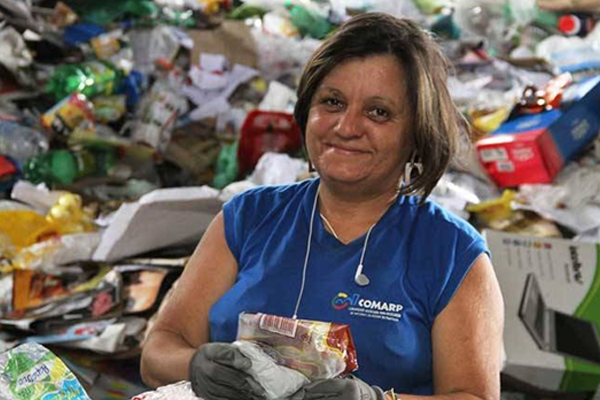|
How cooperatives can help Brazil’s waste pickers build back from COVID-19
Brazil is one of the countries hardest hit by the COVID-19 pandemic, and one of the groups hardest hit within Brazil are the waste pickers, who salvage materials for recycling. They really are at the bottom of the pile.
I work with the waste pickers of Brazil and I hear directly what they say.
“We are afraid… we need help to stop activities, we do not know for how long or what can happen.”
“We cannot work, and we don’t have financial support… we end up not knowing how to manage our income, put food on the table.” To most people, waste pickers are invisible. Yet they perform an essential service for the sustainability and health of cities. They are responsible for around 90 per cent of recycling in Brazil, playing a vital role in the circular and green economies. Rather than being seen as rubbish sorters, they should be viewed as environmental stewards.
Waste picking has always been a hard job. Some issues come from being informal workers – a lack of social protection, no income security. Others relate to the work itself. There are challenges in selling what they find and sort, in dealing with middle men, with the privatization of waste collection, and the lack of enforcement of laws and agreements on waste management.
However, by forming cooperatives, waste pickers had made solid progress in dealing with these challenges. Research I worked on in Brazil shows that cooperatives have helped waste pickers to address a wide range of important, day-to-day issues, including negotiating with public authorities and private intermediaries, occupational safety and health, gender-based violence, housing problems, legal protection, social protection and access to storage space and local market places.
Informal workers have used many different organizing strategies to deal with the challenges they face – federations, associations and cooperatives. In my region, Latin America, cooperatives, which are member-owned enterprises, stand out as a model that combines both solidarity and responses to economic needs.
Today, there are almost 1,300 waste-pickers’ cooperatives in Brazil. Argentina and Colombia also have strong waste pickers’ organizations, mostly cooperatives that have made substantial progress towards integrating their members into waste management chains, improving their working conditions and formalizing the informal recycling process.
The advances made by waste pickers through their cooperatives are the fruit of decades of hard work. COVID-19 threatens these gains. Waste pickers are more susceptible to infection, due to unsanitary workplaces and sorting sheds, and the suspension of segregated waste collection because of the pandemic. Without this they have no work and no income.
But, faced with the pandemic challenge, cooperatives have come through again for their members. We surveyed around 150 cooperative enterprises across 21 states in Brazil, on their response strategies to the pandemic. We saw how they came up with alternative ways to tackle the challenge and help build resilience.
They mobilized early to protect their members, and they created new working conditions to restrict infections. An amazing 98 per cent of surveyed cooperatives reported they had adopted essential safety measures, including personal protective equipment (PPE), disinfection and personal hygiene. They also provided members with virus prevention guidelines – all measures recommended by the Global Alliance of Waste Pickers in their COVID-19 guidance. Once again, cooperatives have shown their relevance. As we look for ways to recover from the pandemic and build a ‘better normal’, it can help us move towards fairer economic and urban systems that are resilient, responsive and sustainable.
By Sonia Dias, Women in Informal Employment: Globalizing and Organizing
|



